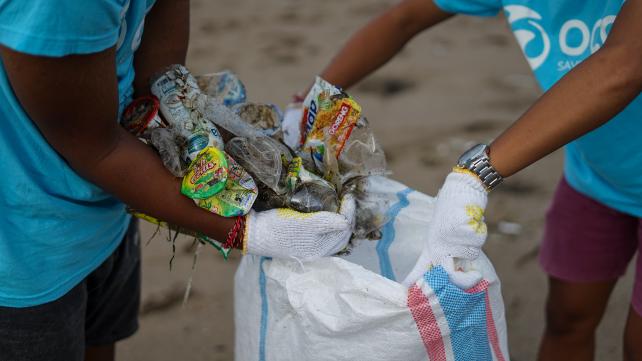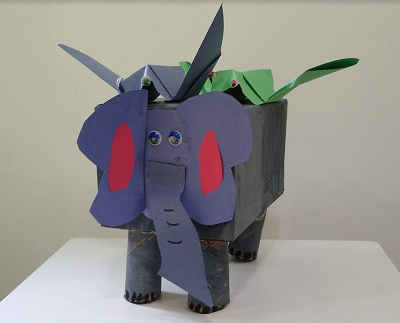
Islam significantly highlights the importance of environmental protection and conservation of natural resources in its teachings. The very basic elements of nature – land, water, fire, forest, and light – belong to all living things, not just human beings.
The most popular hadith - the sayings and actions of Prophet Muhammad (peace and blessings be upon him) - on the environment states, “The world is beautiful and verdant, and verily God, be He exalted, has made you His stewards in it, and He sees how you acquit yourselves.” (Muslim)
There are various other hadiths which deal extensively with aspects of environmental protection such as resource conservation, land reclamation, and environmental hygiene. Our beloved Prophet also discouraged wastage as an outcome of overconsumption and encouraged moderation and modesty in life, through his own example. In this manner he was a living example of the guidance in the Holy Quran:
"Eat and drink: But waste not by excess, for Allah loveth not the wasters."
(Surah Al-A’raf 7: 21)
SubhanAllah, our deen is a reflection of and a complete way of life. From focusing on one's self to seeking the pleasure of Allah, to how we interact with others and be consciously aware of our environment and surroundings.
Passing these Teachings to our Children
We can agree that we are responsible for taking care of our planet. But how can we encourage children to take on this role and mindset?
It is amazing how well children can adapt to their surroundings and to the values we instill in them from an early age. Here are 10 tips to nurture and encourage our children to take on the role as a vicegerent to protect our beautiful mother earth. Children understand and comprehend better when we use an affirmative tone and affirmation statements can be particularly powerful. Make these part of a family action plan so that your words are also matching your deeds.
1. WE turn off the light when we leave the room.
Turning off extra lights can help save valuable energy. You may choose to assign your child(ren) with the responsibility to do so and reward them in a positive way to reinforce this habit.
2. WE turn off the water when we brush our teeth.
Completing this one task can actually save 18 glasses of water! Conduct a visual demonstration to dramatize the point and then re-use the collected water for plants.
In an age where our children have come to expect running water in the bathroom, let's be sure to respect its sanctity. Water is vital to all life forms and Islam forbids its wastage and its use without benefit. According to the Quran and traditions of the Prophet Muhammad (peace and blessings be upon him), the preservation of water is a form of worship and each one of us will be questioned as to how we used the resources available to the best of our advantage.
3. WE always throw our trash away in the bin.
Reducing litter helps to keep the world safe and clean. Encourage children to collect trash and dispose of it properly, especially when going on a picnic or to the beach. Make them aware of the consequences of littering and the dangers that it can cause to our wildlife.
4. WE feed the birds in winter.
A consideration here helps the birds prepare for nesting in the spring. Not only will this help children to be sensitive to the animals that are in our midst, but it also develops emotional skills such as empathy from an early age. It would be a good idea to put out some water for the birds in the hot summer months, too.
5. WE use both sides of the paper.
Conserving paper will help save many trees from being cut down and animals from becoming extinct and endangered. Let’s not restrict this to paper only, we can always re-use paper bags, mail, or other writing-friendly materials for drawing/art work.
6. WE turn off and unplug the TV when we are not watching it.
When you turn off the TV, quite naturally you open the space to opportunities for communication and other activities. And unplugging it can save even more unnecessary usage of electricity.

7. WE creatively re-use things around the house.
We can use and re-use lots of things before we throw them away and these are good habits to adopt in every household. Think about art projects that can be made with toilet paper rolls, boxes, milk and egg cartons, used wrapping paper, etc. Let your child be creative in their own way and don't forget to appreciate their work product. It's always good to get involved with them, but if not physically supervising, you can help them feel reassured that they are producing something amazing. Also try and reuse paper bags, cloth bags for groceries, and reusable containers for storing leftovers. Every little bit helps reduce the mountains of trash in our landfills.
8. WE help sort the trash by recycling.
Cans, glass, paper, and plastic can all be recycled. Many municipalities in the U.S. and Canada even have curbside collection of these items. Organic waste can also be composted. Get your children involved in a weekly trash sorting activity. They will love it!
9. WE like to walk or bike whenever possible.
Walking or biking is great exercise and helps us stay fit. Taking care of our bodies is an important way to show gratitude to Allah! This also helps save gas and cuts down on air pollution, too.
10. WE can plant seeds and help them grow.
Plants help keep the air clean and healthy. They also add beauty to our surroundings and provide for a natural habitat for birds. Planting fruit trees can also bring sadaqa jariya (continuous charity) which can help earn tremendous rewards for generations, insha'Allah, and to the giver on the Day of Judgement.
By taking ownership and responsibility as a family, we can help each other be consciously aware of our acts and the footprint that we leave in this world. Let's pledge to use the resources at our disposal wisely and let our future generations also realize the benefits in doing so. In the process, we can also benefit from showing gratitude to Allah for His mercy and blessings.
Umm Ahmed is an early childhood educator and writer who is passionate about seeking knowledge and passing it onto others. She and her husband are parents to three boys and are currently living in Abu Dhabi. The insights for this article were inspired by a book called, 10 Things I Can Do to Help My World by Melanie Walsh.



Add new comment